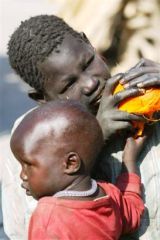Thousands of returning southern Sudanese face uncertain future at home
By RODRIQUE NGOWI, Associated Press Writer
RUMBEK, Sudan, Jan 23, 2005 (AP) — Elizabeth Adak Shindu paid a high price to return home. She walked for 30 days, endured hunger and disease and used up the last of her life savings. When she finally reached this sprawling, dusty town, she found another family living on her land.

|
|
Two boys share a mango fruit, Thursday, Jan. 20, 2005 in a camp for returnees in Rumbek in southern Sudan. (AP). |
Full of hope, thousands like Shindu have started making their way back to southern Sudan as Africa’s longest running civil war grinds to a halt. They are returning to a land of torched villages, farms riddled with land mines, ransacked schools and clinics — and little help to begin anew.
More than 4 million people fled their homes during 21 years of fighting that left this vast region of grasslands, forests, mountains and swamps one of the poorest in the world. Some found sanctuary in neighboring countries, but most have been living in the government-held north where they make up the world’s largest displaced population.
U.N. officials expect as many as 1.2 million to return this year after the Arab Muslim-dominated government in Khartoum signed a peace deal with rebels fighting for more autonomy and a greater share of the country’s wealth in the mostly African Christian and animist south.
But the devastated towns and villages they’re coming back to can’t cope with an influx that size, warned Vincent Chordi, head of the U.N. refugee agency in southern Sudan.
“We know of places were 100 people arrive a day from the north,” said U.N. humanitarian spokesman Ben Parker. “They miss home. They want to make an early start in getting their land, building their houses and reconnecting with their lives down here.”
Without even the most basic infrastructure, U.N. officials say it could take six to eight months to set up a relief operation to assist the expanding population in the south. U.N. agencies have appealed for $1.5 billion in funding for Sudan, most of it for the south.
In the meantime, the new arrivals cope as best they can.
Shindu was among an estimated 400,000 who returned last year, encouraged by progress during talks resulting in the Jan. 9 accord, which provides for a national power-sharing government and autonomy in the south.
The tall, emaciated mother of nine now sits eating a handful of nuts from a marula tree in front of her tiny grass hut in a makeshift camp built among thorny bushes and scattered palms in this town of 50,000 — set to become the south’s provisional capital. She survives, she says, by foraging for fruit, roots and leaves in the surrounding forests inhabited by lions and hyenas.
Life was easier in the government-held town of Wau, 130 miles northeast of Rumbek, to which she fled 19 years ago when rebels attacked government troops here and killed her husband, a policeman. Shindu could make a living there washing dishes and clothes, and selling buckets of water.
Still, she says, it was worth the tortuous journey to return home.
“We had to walk for miles while carrying children on our backs; we had to walk for days while we were hungry; we had to sleep in the forest when we were very exhausted,” Shindu said. “It was a test of our commitment to our native home — and our faith in God.”
Every step of the way, there was the fear of setting off one of the millions of land mines, unexploded grenades and shells scattered across the south.
One land mine was recently recovered near Shindu’s camp in Rumbek. A spontaneous bush fire this week exploded another mine near the town’s dusty airstrip.
Those who stayed behind here through years of conflict have little to offer the 500 who have returned so far to the town of mud huts with thatched conical roofs.
“Many of the people who stayed behind have less than those who went away,” Parker said. “Life as a displaced person in northern Sudan is not easy, but at least some of them were able to make a living, to be involved in a cash economy, put their children in schools.”
Resentment is brewing among those returnees who have been unable to reclaim land left behind. The town’s rudimentary court system is ill-equipped to settle the disputes, and the dispossessed say their only option is to buy back their property from its current occupants.
“A family of six now lives and cultivates my family land,” said John Maker Mapour, snorting with anger as his wife peeled a marula fruit. “I was born here in Rumbek, and now I must pay the new occupants a lot of money to get back the land. It is too difficult.”
The war may be officially over, but for Mapour, Shindu and countless others there won’t be peace until they have land on which to make a home, grow food and rebuild their lives.
“There is still a very long process ahead,” Mapour said.
